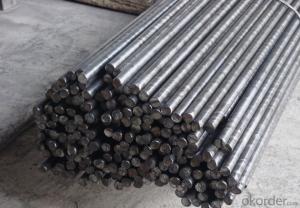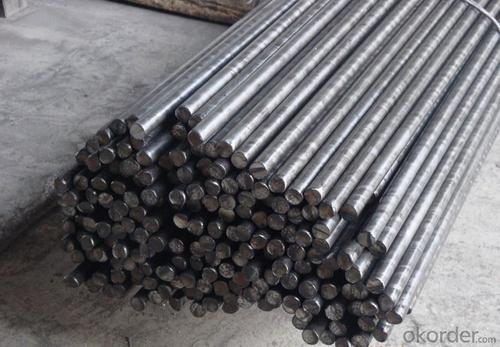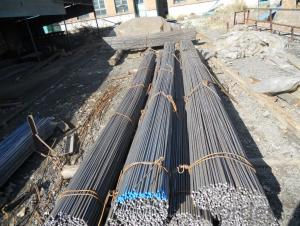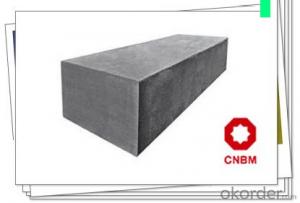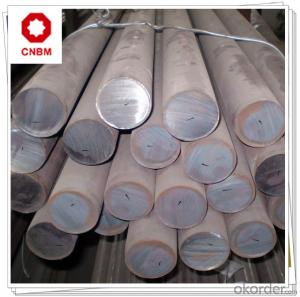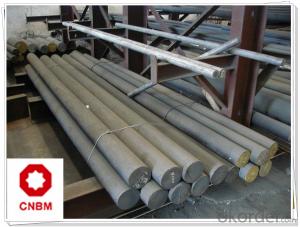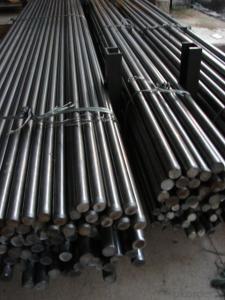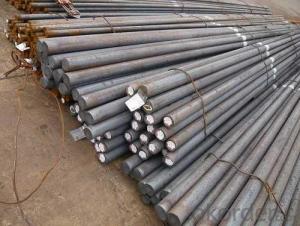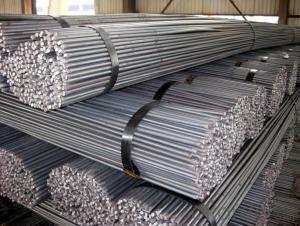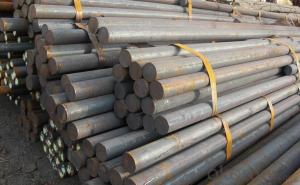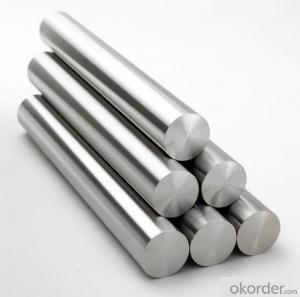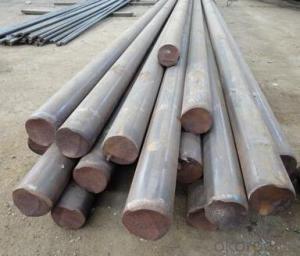GB 45#/SAE 1045 Steel Round Bar 38mm/40mm
- Loading Port:
- China main port
- Payment Terms:
- TT or LC
- Min Order Qty:
- 50 m.t
- Supply Capability:
- 10000 m.t/month
OKorder Service Pledge
OKorder Financial Service
You Might Also Like
GB 45#/SAE 1045 Steel Round Bar 38mm/40mm
Description:
-Specification:
| Diameter(mm) | Mass(Kg/m) | Length(m) |
| 38 | 11.24 | 6m, 12m |
| 40 | 12.56 | 6m, 12m |
| 42 | 13.85 | 6m, 12m |
-Standard: GB/SAE/Japanese Standard
-Material: GB 45#/SAE1045/S45C
Chemical Composition of GB 45#/SAE 1045 Steel Round Bar 38mm/40mm:
| C | Si | Mn | P | S | Ni | Cr | Cu |
| 0.42-0.50 | 0.17-0.37 | 0.50-0.80 | ≤0.035 | ≤0.035 | ≤0.30 | ≤0.25 | ≤0.25 |
Packaging & Delivery of GB 45#/SAE 1045 Steel Round Bar 38mm/40mm:
Packaging Detail: All goods are packed in bundle with steel strips and shipped by break bulk vessel or container (depend on target market and different ports)
Delivery Detail: 45 days
MOQ: 50 tons per specification; we can negotiate the quantity if the specification is normal or we have stock of one specification.
Weight: The price invoicing on theoretical weight basis or actual weight basis depends on customer’s request.
Shipment: The shipment of bulk break or container is depends on customer’s request and the situation of the port of destination.
Documents given: Full set of original clean on board bill of lading; Original signed commercial invoice; Original packing list; Policy of insurance; Certificate of origin and what the target market needs.
Payment:
-Invoicing on theoretical weight or actual weight a s customer’s request.
-FOB, CFR or CIF.
-Regular terms of payment:
1, 30% payment in advance, the remaining balance (70% payment) against the copy of B/L.
2, 30% payment in advance, the remaining balance (70% L/C) against the copy of B/L.
3, Negotiable.
Images of GB 45#/SAE 1045 Steel Round Bar 38mm/40mm:
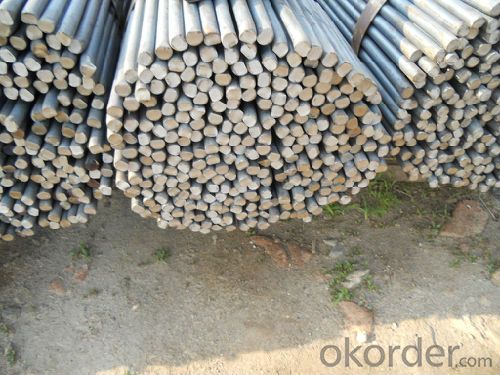
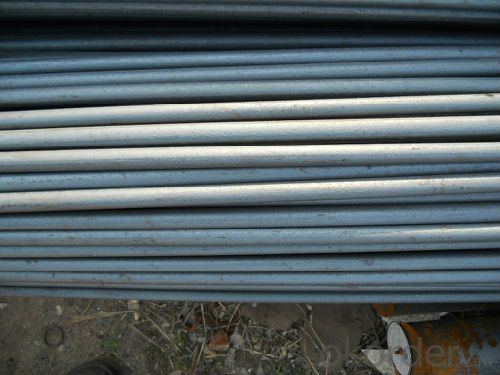
*If you would like to get our price, please inform us the size, standard/material and quantity. Thank you very much for your attention.
- Q: How do steel round bars compare to brass round bars?
- Steel round bars and brass round bars have several key differences that make them suitable for different applications. Firstly, steel round bars are much stronger and more durable compared to brass round bars. Steel has a higher tensile strength, making it ideal for applications that require high strength and resistance to heavy loads. It is commonly used in construction, manufacturing, and automotive industries where strength and durability are crucial. On the other hand, brass round bars are known for their excellent corrosion resistance and electrical conductivity. Brass is an alloy of copper and zinc, which gives it a unique combination of properties. It is often used in applications that require good electrical conductivity, such as electrical connectors, plumbing fittings, and musical instruments. Brass also has an attractive golden appearance, making it a popular choice for decorative purposes. In terms of cost, steel round bars are generally more affordable compared to brass round bars. Steel is widely available and produced in large quantities, resulting in a lower cost per unit. Brass, being an alloy of copper, which is a relatively expensive metal, is generally more expensive. Another important factor to consider is machinability. Steel round bars are generally easier to machine and work with compared to brass round bars. Steel has good cutting and drilling properties, making it easier to fabricate into various shapes and sizes. Brass, on the other hand, tends to have a higher machinability rating, meaning it is easier to cut and shape compared to other metals. In summary, steel round bars are stronger, more durable, and generally more affordable than brass round bars. They are suitable for applications that require high strength and resistance to heavy loads. Brass round bars, on the other hand, offer excellent corrosion resistance, electrical conductivity, and an attractive appearance. They are commonly used in applications that require good electrical conductivity and for decorative purposes. The choice between steel and brass round bars ultimately depends on the specific requirements of the application.
- Q: What are the advantages of using cobalt-alloy steel round bars?
- There are several advantages of using cobalt-alloy steel round bars. Firstly, cobalt-alloy steel has excellent strength, hardness, and wear resistance, making it suitable for applications that require durability and long-lasting performance. Additionally, cobalt-alloy steel has high temperature resistance, making it ideal for use in high-temperature environments. Furthermore, cobalt-alloy steel offers excellent corrosion resistance, making it suitable for applications in harsh and corrosive environments. Lastly, cobalt-alloy steel round bars can be easily machined and fabricated, offering flexibility and ease of use for various manufacturing processes.
- Q: Can steel round bars be used for making punches and dies?
- Yes, steel round bars can be used for making punches and dies. Steel round bars are commonly used in tool and die making due to their high strength and durability. They can be machined or forged into the desired shape and then hardened to ensure a long lifespan and resistance to wear and deformation. The hardness and toughness of steel round bars make them ideal materials for withstanding the high forces and pressures involved in punching and shaping various materials. Additionally, steel round bars are readily available in various sizes and grades, making them a cost-effective choice for making punches and dies.
- Q: What are the different types of steel round bars used in the automotive exhaust systems?
- Automotive exhaust systems utilize various types of steel round bars, each possessing distinct characteristics and uses. Let's explore some of the commonly employed varieties: 1. Stainless Steel Round Bars: Renowned for its exceptional resistance to corrosion and high temperatures, stainless steel stands as a favored option for exhaust systems. Its versatility allows for application in both primary and secondary components, including headers, catalytic converters, and mufflers. 2. Carbon Steel Round Bars: Carbon steel represents another frequently employed material in exhaust systems. Its commendable strength and durability render it suitable for various components, such as exhaust pipes and hangers. However, due to its susceptibility to corrosion in comparison to stainless steel, appropriate coating or treatment becomes imperative to prevent rusting. 3. Aluminized Steel Round Bars: Aluminized steel, a form of carbon steel coated with an aluminum-silicon alloy, boasts excellent corrosion resistance and heat reflectivity. These attributes make it an ideal choice for exhaust systems, particularly in exhaust pipes and mufflers, as it aids in heat reduction and enhances overall durability. 4. Titanium Round Bars: Although less commonly utilized due to its substantial cost, titanium serves as an extraordinarily lightweight and durable material, offering exceptional corrosion resistance. In high-performance or specialized exhaust systems, titanium round bars may be incorporated to reduce weight and improve overall performance. Its presence is often observed in exhaust tips and high-end aftermarket exhaust systems. In conclusion, the selection of steel round bars for automotive exhaust systems hinges on various factors, including cost, performance requirements, and specific application needs. Manufacturers meticulously choose the appropriate steel type to ensure longevity, efficiency, and compliance with emissions regulations.
- Q: Can steel round bars be used in the automotive industry?
- Indeed, the automotive industry does make use of steel round bars. These bars are frequently employed in various capacities within the industry. Specifically, they are commonly utilized in the fabrication of different components, including axles, drive shafts, suspension parts, and steering components. The reason for their popularity lies in their exceptional attributes, such as high strength, durability, and resistance to wear and tear. These qualities enable them to withstand the rigorous conditions and heavy loads that automotive components are subjected to. Moreover, the ease with which steel round bars can be machined and welded facilitates efficient production and assembly processes in the automotive sector. Consequently, steel round bars are highly regarded as a dependable and cost-effective option for automotive manufacturers, making them a favored material in the industry.
- Q: What are the different types of steel round bars available in the market?
- There are several different types of steel round bars available in the market, including mild steel round bars, carbon steel round bars, alloy steel round bars, stainless steel round bars, and tool steel round bars. Each type of steel round bar has its own specific properties and applications, making them suitable for various industries and purposes.
- Q: What are the advantages of using copper-alloy steel round bars?
- There are several advantages of using copper-alloy steel round bars in various applications. Firstly, copper-alloy steel round bars offer excellent corrosion resistance. The presence of copper in the alloy helps to protect the steel from rust and corrosion, making it suitable for use in environments with high levels of moisture or chemicals. This corrosion resistance extends the lifespan of the round bars, reducing the need for frequent replacements and maintenance. Secondly, copper-alloy steel round bars have high thermal and electrical conductivity. The copper content in the alloy enhances these properties, making them ideal for applications that require efficient heat transfer or electrical conductivity. This makes them suitable for use in electrical components, heat exchangers, and other similar applications. Another advantage of copper-alloy steel round bars is their superior machinability. Copper has excellent machinability properties, which allows for easy cutting, drilling, and shaping of the round bars. This makes them easier to work with and reduces machining time and costs. Additionally, copper-alloy steel round bars offer good strength and toughness. The steel component in the alloy provides the necessary strength to withstand heavy loads and impacts, while the copper component enhances the toughness, making them resistant to cracking or breaking under stress. This makes them suitable for use in structural applications, where high strength and durability are required. Furthermore, copper-alloy steel round bars exhibit good thermal stability. They can withstand high temperatures without losing their mechanical properties, making them suitable for applications that involve exposure to extreme heat or thermal cycling. In conclusion, the advantages of using copper-alloy steel round bars include excellent corrosion resistance, high thermal and electrical conductivity, superior machinability, good strength and toughness, and high thermal stability. These properties make them a preferred choice in various industries, including construction, electrical, automotive, and manufacturing.
- Q: What are the different types of steel round bar alloys used in the construction industry?
- In the construction industry, various steel round bar alloys are commonly utilized. The following are some of the most favored alloys: 1. Carbon Steel: This type of steel alloy is extensively employed in construction due to its exceptional strength and durability, enabling it to be used in a wide array of applications. 2. Stainless Steel: With its remarkable resistance to corrosion and staining, stainless steel is an ideal choice for construction projects that involve exposure to moisture or chemicals. It finds applications in handrails, kitchen equipment, and structural components. 3. Alloy Steel: This steel variant contains additional alloying elements like manganese, chromium, or nickel, which augment its mechanical properties. Alloy steel round bars are renowned for their high tensile strength, toughness, and wear resistance, making them suitable for heavy-duty applications. 4. Tool Steel: Designed specifically for manufacturing tools and machinery components, tool steel round bars are recognized for their hardness, resistance to abrasion, and ability to retain their shape at high temperatures. They are commonly utilized in the construction industry for fabricating cutting tools, dies, and molds. 5. Duplex Steel: This alloy combines the qualities of both austenitic and ferritic stainless steels. Duplex steel round bars offer excellent corrosion resistance, high strength, and good weldability. They are frequently employed in construction projects that necessitate a combination of strength and corrosion resistance, such as in marine or coastal environments. In summary, the selection of a steel round bar alloy in the construction industry hinges on the specific application and project requirements. Each alloy boasts distinct properties and advantages, enabling construction professionals to choose the most suitable option for their needs.
- Q: What are the different types of defects that can occur in steel round bars?
- Steel round bars can experience a range of defects that differ in severity and impact on overall quality and performance. Common types of defects include surface defects, internal defects, dimensional defects, decarburization, lamination, and incomplete heat treatment. Surface defects, such as scratches, pits, and scaling, are visible on the external surface of the bar. While these defects may not compromise the bar's structural integrity, they can affect its aesthetic appeal and potentially lead to corrosion if not addressed properly. Internal defects, like voids, inclusions, and segregation, occur within the body of the bar. These defects can weaken the bar's mechanical properties, jeopardize its structural integrity, and even cause cracking or failure under stress. Dimensional defects refer to variations in the size or shape of the bar, such as differences in diameter, length, or straightness. These defects can occur during manufacturing and can impact the bar's functionality and compatibility with other components. Decarburization is a defect that arises when the surface layer of the bar loses carbon due to exposure to high temperatures during manufacturing or heat treatment. This defect weakens the bar's hardness and strength, making it more susceptible to wear, fatigue, or failure. Lamination defects occur when there are layers or separations within the bar, often resulting from inadequate rolling or processing techniques. These defects reduce the bar's strength and ductility, making it prone to fracture or failure. Incomplete heat treatment can occur if the process is not performed correctly or if there are inconsistencies in cooling or reheating. This can lead to variations in hardness, strength, or toughness along the length of the bar. Manufacturers and quality control teams employ various testing and inspection methods to detect and mitigate these defects, ensuring that the bars meet the necessary standards and specifications. It is crucial to consider the specific application and requirements of the steel round bar when assessing the severity and impact of these defects.
- Q: Can steel round bars be used for tooling applications?
- Steel round bars can indeed be used for tooling applications. Steel is a highly versatile material that possesses excellent strength, durability, and resistance to wear and tear. Round bars made of steel can be machined, heat treated, and shaped to create various tools such as punches, dies, drills, and lathe tools. The round shape of the bars allows for easy machining and shaping processes. Additionally, steel round bars can be further enhanced with surface treatments or coatings to improve their performance in specific tooling applications. Overall, steel round bars are commonly used in tooling applications due to their excellent mechanical properties and adaptability.
Send your message to us
GB 45#/SAE 1045 Steel Round Bar 38mm/40mm
- Loading Port:
- China main port
- Payment Terms:
- TT or LC
- Min Order Qty:
- 50 m.t
- Supply Capability:
- 10000 m.t/month
OKorder Service Pledge
OKorder Financial Service
Similar products
Hot products
Hot Searches
Related keywords
